CUNY Information Managers Forum Red Hat, Inc
Slide 1

Slide 2

Introductions Shawn Wells swells@redhat.com Federal Solutions Architect Mark St. Laurent mstlaure@redhat.com Federal Solutions Architect / Security SME / Forensics Expert Michael Brown mbrown@redhat.com Federal Solutions Architect / Identity Management SME 2
Slide 3

Agenda Time Topic Speaker 9:30 – 10:00 Meet and Greet - Breakfast All 10:00 - 11:00 RHEL5 Overview Shawn 11:00 - 12:00 RHEL & SELinux Dave, Richard 12:00 - 12:45 Lunch & Learn – (SELinux Live Lab: Designing your own Policies) (OPTIONAL) Red Hat 12:45 - 14:30 Securing the Infrastructure, Continud (Incident Response) Mark 14:30 - 15:30 Enterprise Directory Server Mike 15:30 – 16:00 Certificate Management Mike 3
Slide 4

Red Hat, Inc Headquarters: Raleigh, NC Founded 1993 Public 1999 (NYSE: RHT) Operating in 27 countries Over 2200 Employees worldwide Over 50% are engineers 80% Government/Commercial Linux Market Share 40+% Year over Year Growth (For 23 straight quarters) 4
Slide 5

BEA WebLogic Veritas VMWare EMC Powerpath SUN Solaris 5
Slide 6

Red Hat Development Model 6
Slide 7

Open Source as a Security Innovation 1. More eyes on the code, therefore less security bugs 2. Red Hat’s rapid response to any vulnerabilities Time from a critical issue being known to the public until the day that a fix is available via RHN Red Hat Enterprise Linux 4, Feb 2005-Feb 2006 7
Slide 8

8
Slide 9

9
Slide 10

Visit http://www.redhat.com/promo/vendor for more information 10
Slide 11

Red Hat Technology Update - Virtualization - Security/MLS/Common Criteria
Slide 12

The Xen Hypervisor ● Flexible IT Services ● Disaster Tolerance ● Life Cycle Management ● Live Migration 12
Slide 13

Virtualization Architecture 13
Slide 14

Introduction to libvirt API Hypervisor agnostic Stable API for tool/app development CIM providers; Python, C bindings, scriptable Allows authenticated/encrypted sessions to remote hypervisors Current support for Xen Hypervisor KVM Hypervisor QEMU Hypervisor 14
Slide 15

Red Hat Security Certifications ● ● ● ● ● NIAP/Common Criteria: The most evaluated operating system platform ● Red Hat Enterprise Linux 2.1 – EAL 2 (Completed: February 2004) ● Red Hat Enterprise Linux 3 EAL 3+/CAPP (Completed: August 2004) ● Red Hat Enterprise Linux 4 EAL 4+/CAPP (Completed: February 2006) ● Red Hat Enterprise Linux 5 EAL4+/CAPP/LSPP/RBAC (Completed: June 2007) DII-COE ● Red Hat Enterprise Linux 3 (Self-Certification Completed: October 2004) ● Red Hat Enterprise Linux: First Linux platform certified by DISA DCID 6/3 ● Currently PL3/PL4: ask about kickstarts. ● Often a component in PL5 systems DISA SRRs / STIGs ● Ask about kickstarts. FIPS 140-2 ● Red Hat / NSS Cryptography Libraries certified Level 2 15
Slide 16
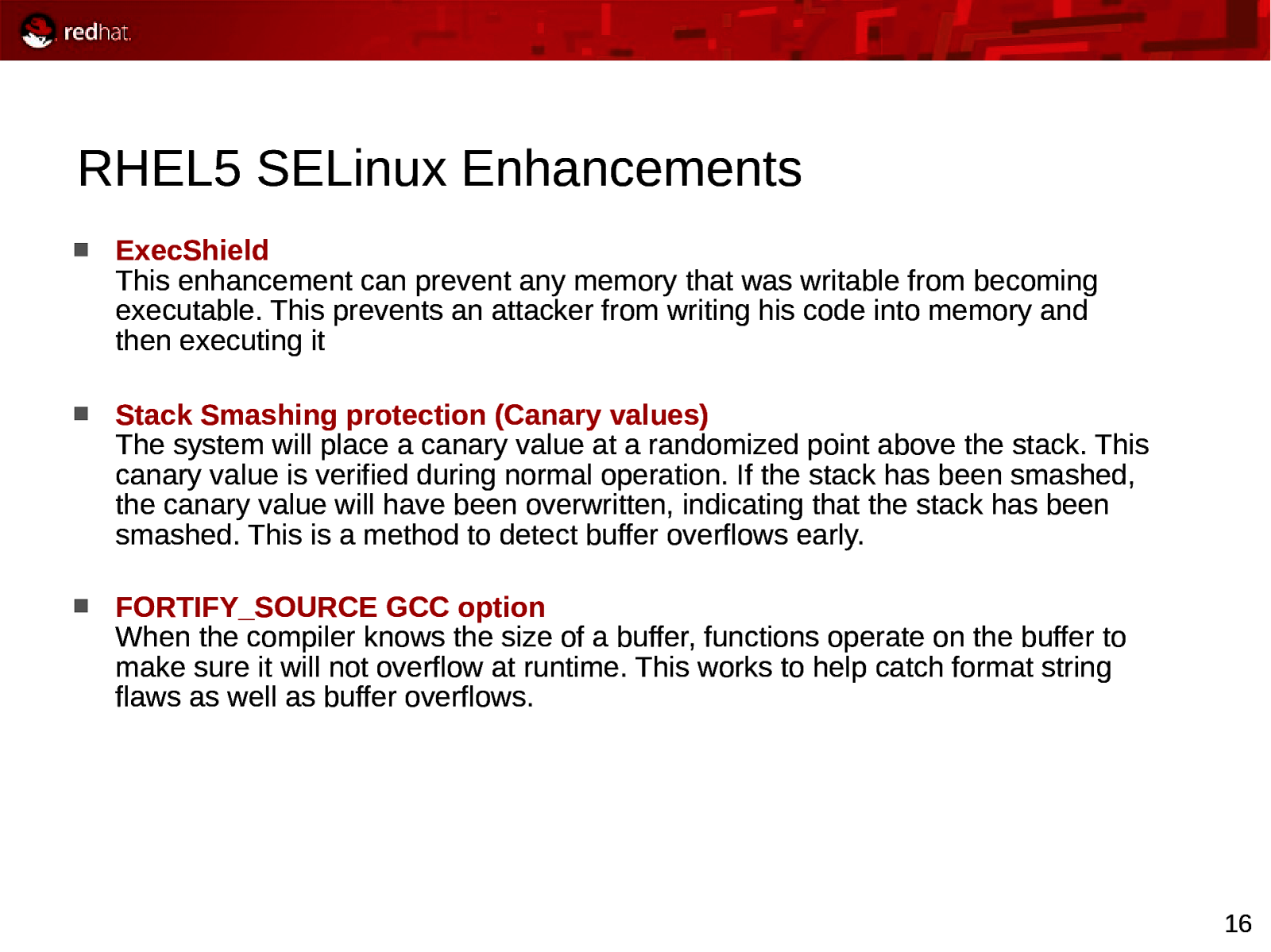
RHEL5 SELinux Enhancements ExecShield This enhancement can prevent any memory that was writable from becoming executable. This prevents an attacker from writing his code into memory and then executing it Stack Smashing protection (Canary values) The system will place a canary value at a randomized point above the stack. This canary value is verified during normal operation. If the stack has been smashed, the canary value will have been overwritten, indicating that the stack has been smashed. This is a method to detect buffer overflows early. FORTIFY_SOURCE GCC option When the compiler knows the size of a buffer, functions operate on the buffer to make sure it will not overflow at runtime. This works to help catch format string flaws as well as buffer overflows. 16
Slide 17

LVM Host-Based Synchronous Mirroring Each write is simultaneously written to 2 or more local or SAN disks (RAID1) LVM automatically detects failure, uses the identical, mirrored disks or LUN Upon restoration, recovery process begins in background If minor outage, transaction log rapidly replays missed I/O 17
Slide 18

Device Mapper Multipath IO (MPIO) Connects & manages multiple paths through SAN to storage array Upon component failure, MPIO redirects traffic via redundant pathing Active/Active array support Bundled into RHEL 18
Slide 19
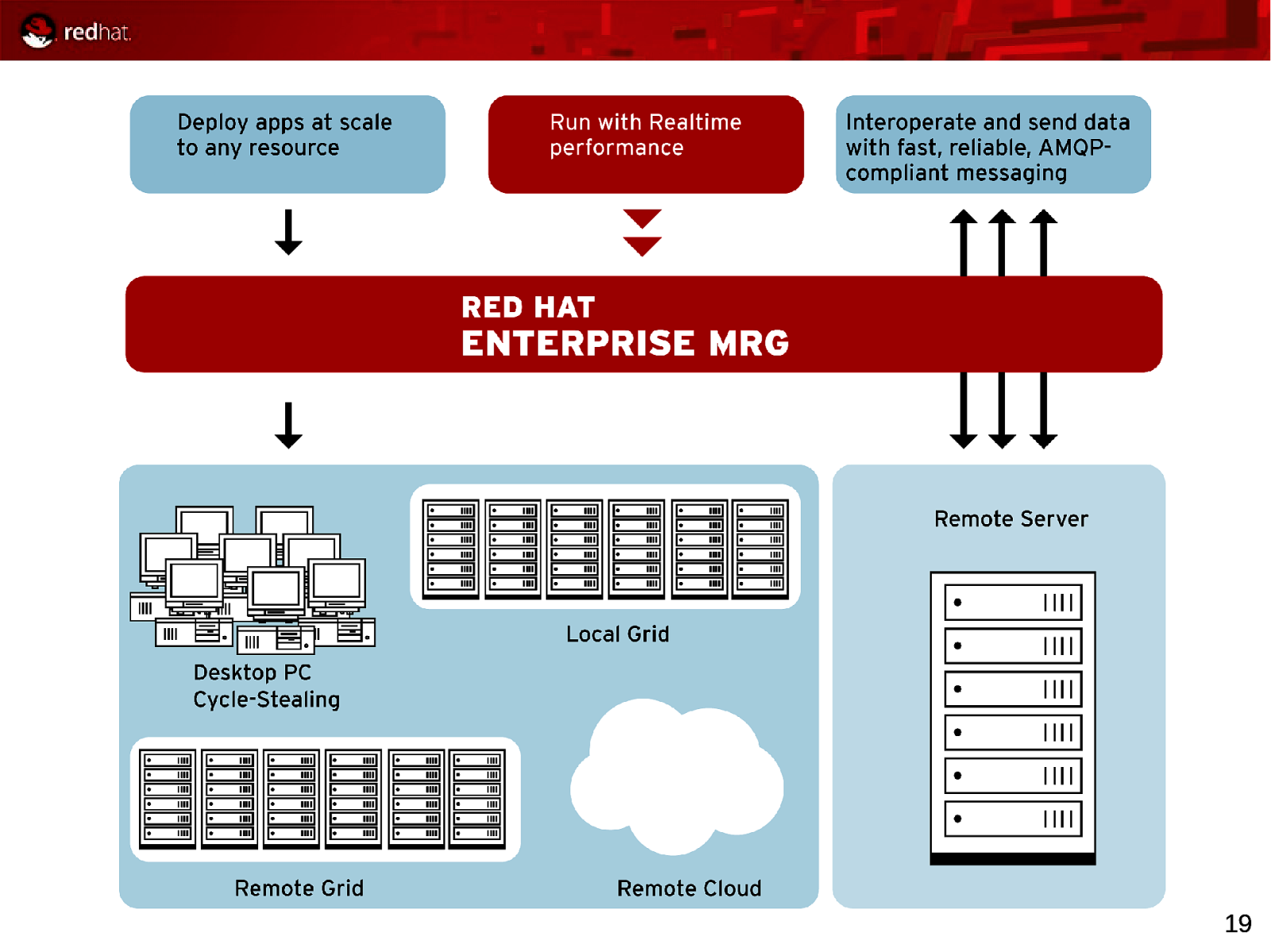
19
Slide 20
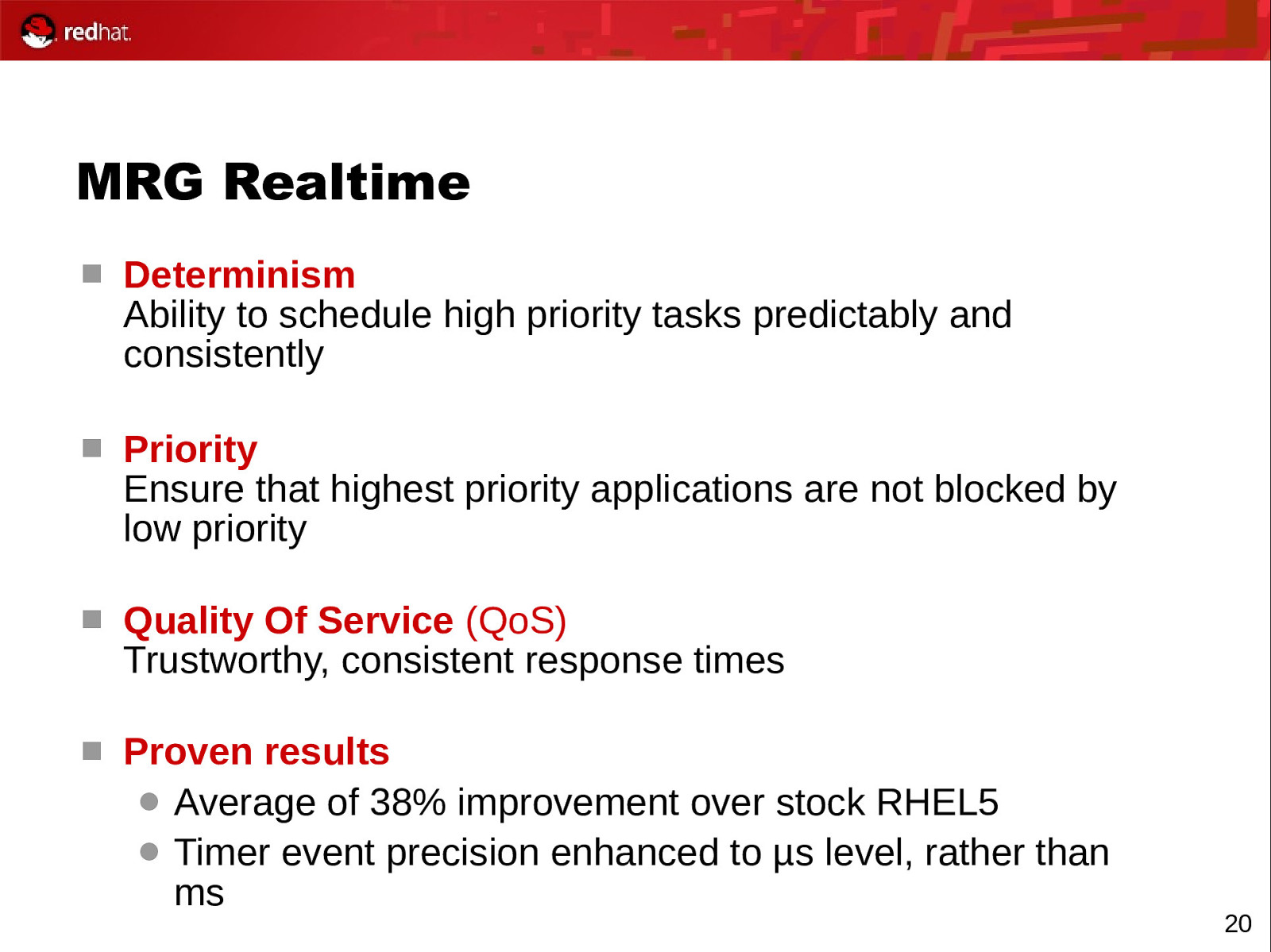
MRG Realtime Determinism Ability to schedule high priority tasks predictably and consistently Priority Ensure that highest priority applications are not blocked by low priority Quality Of Service (QoS) Trustworthy, consistent response times Proven results Average of 38% improvement over stock RHEL5 Timer event precision enhanced to µs level, rather than ms 20
Slide 21
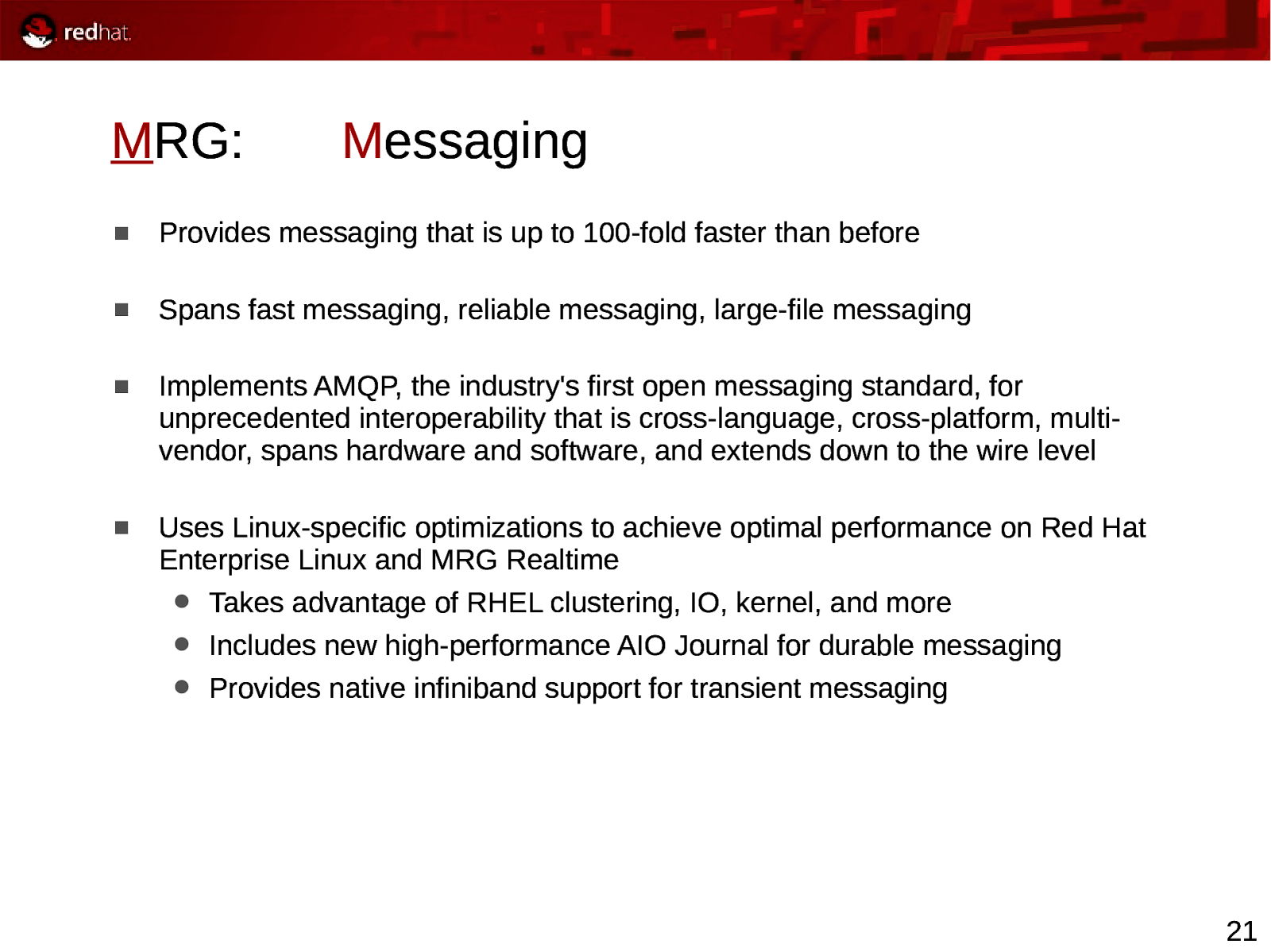
MRG: Messaging Provides messaging that is up to 100-fold faster than before Spans fast messaging, reliable messaging, large-file messaging Implements AMQP, the industry’s first open messaging standard, for unprecedented interoperability that is cross-language, cross-platform, multivendor, spans hardware and software, and extends down to the wire level Uses Linux-specific optimizations to achieve optimal performance on Red Hat Enterprise Linux and MRG Realtime Takes advantage of RHEL clustering, IO, kernel, and more Includes new high-performance AIO Journal for durable messaging Provides native infiniband support for transient messaging 21
Slide 22
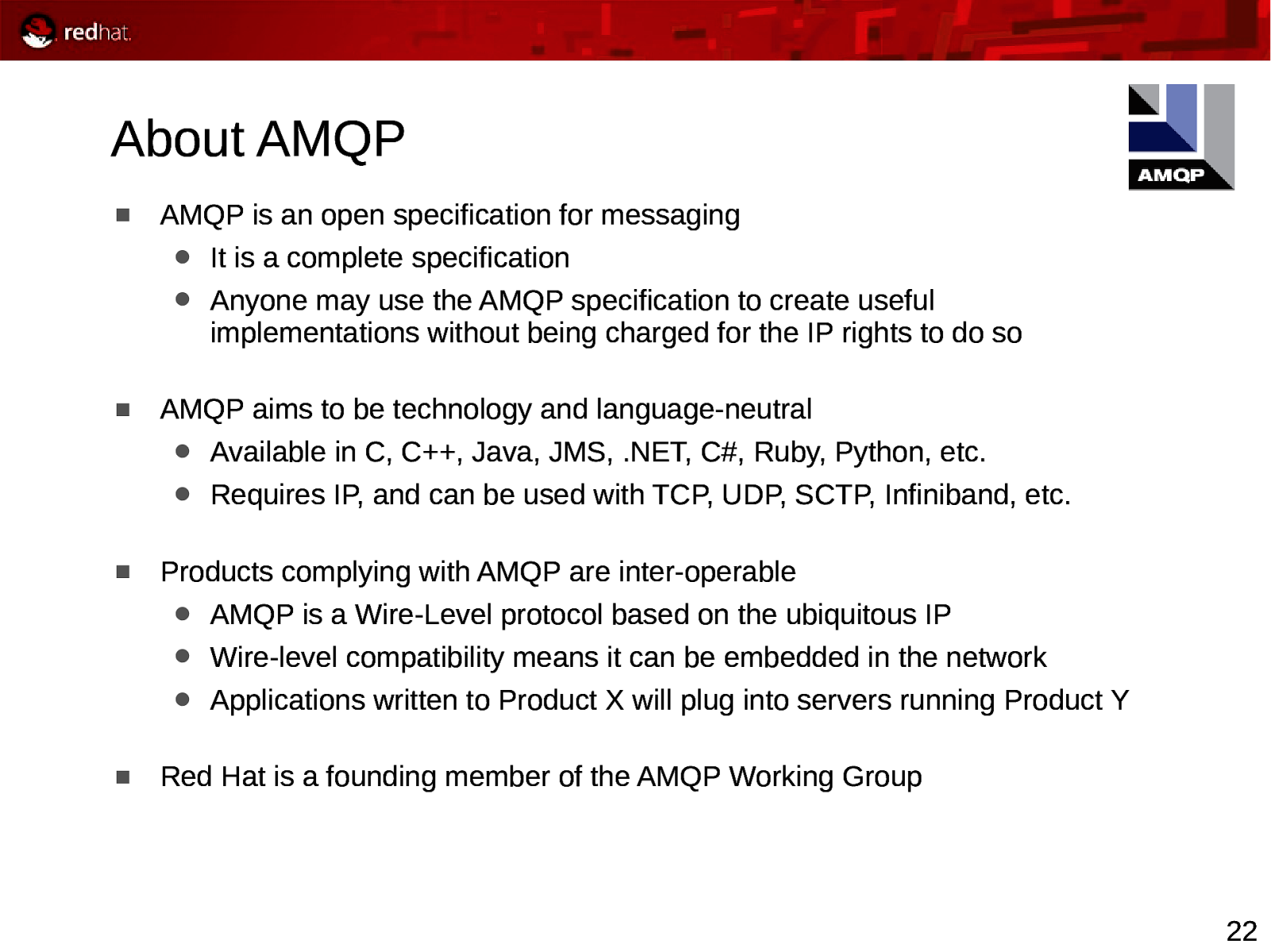
About AMQP AMQP is an open specification for messaging It is a complete specification Anyone may use the AMQP specification to create useful implementations without being charged for the IP rights to do so AMQP aims to be technology and language-neutral Available in C, C++, Java, JMS, .NET, C#, Ruby, Python, etc. Requires IP, and can be used with TCP, UDP, SCTP, Infiniband, etc. Products complying with AMQP are inter-operable AMQP is a Wire-Level protocol based on the ubiquitous IP Wire-level compatibility means it can be embedded in the network Applications written to Product X will plug into servers running Product Y Red Hat is a founding member of the AMQP Working Group 22
Slide 23
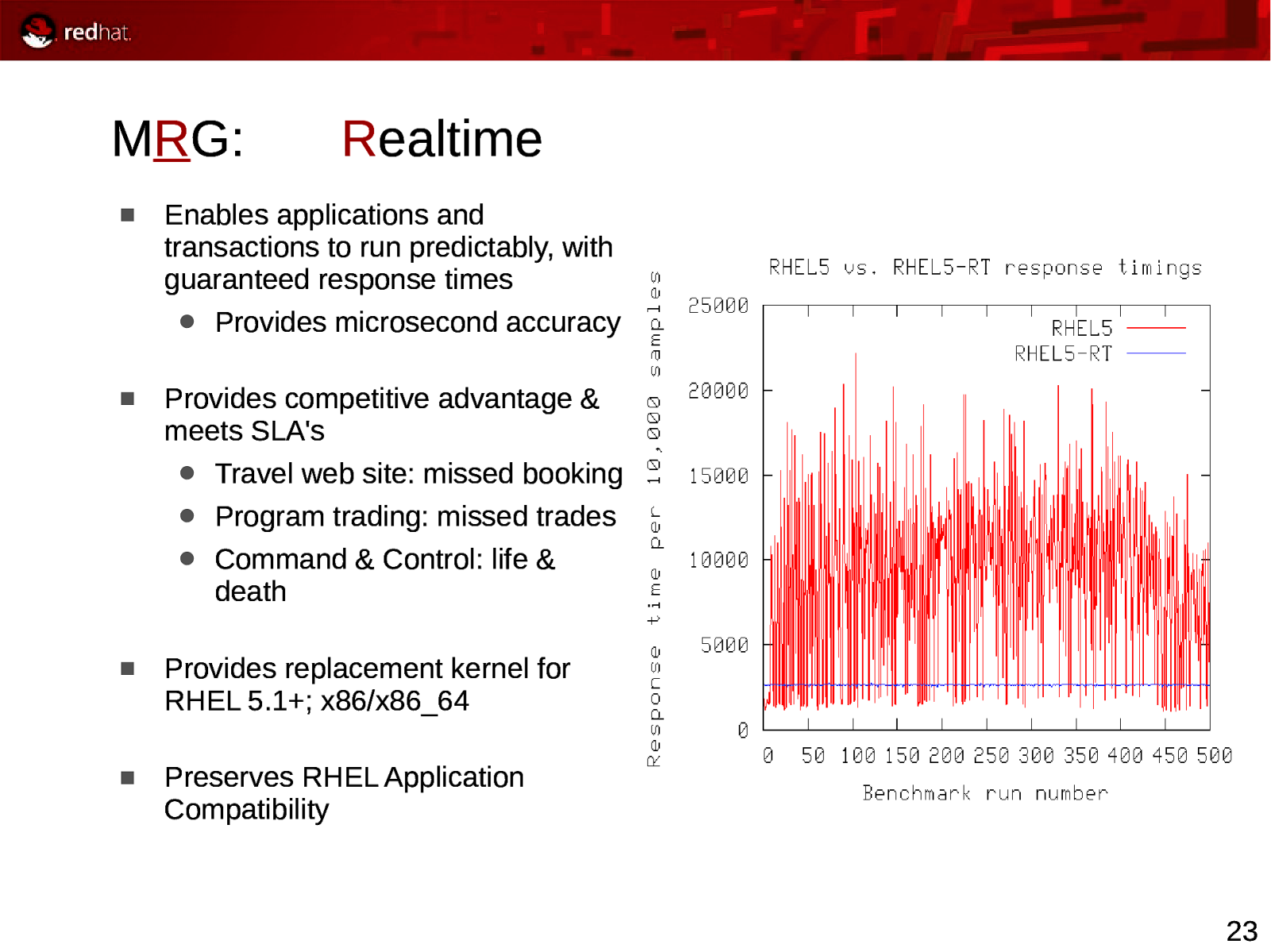
MRG: Realtime Enables applications and transactions to run predictably, with guaranteed response times Provides microsecond accuracy Provides competitive advantage & meets SLA’s Travel web site: missed booking Program trading: missed trades Command & Control: life & death Provides replacement kernel for RHEL 5.1+; x86/x86_64 Preserves RHEL Application Compatibility 23
Slide 24
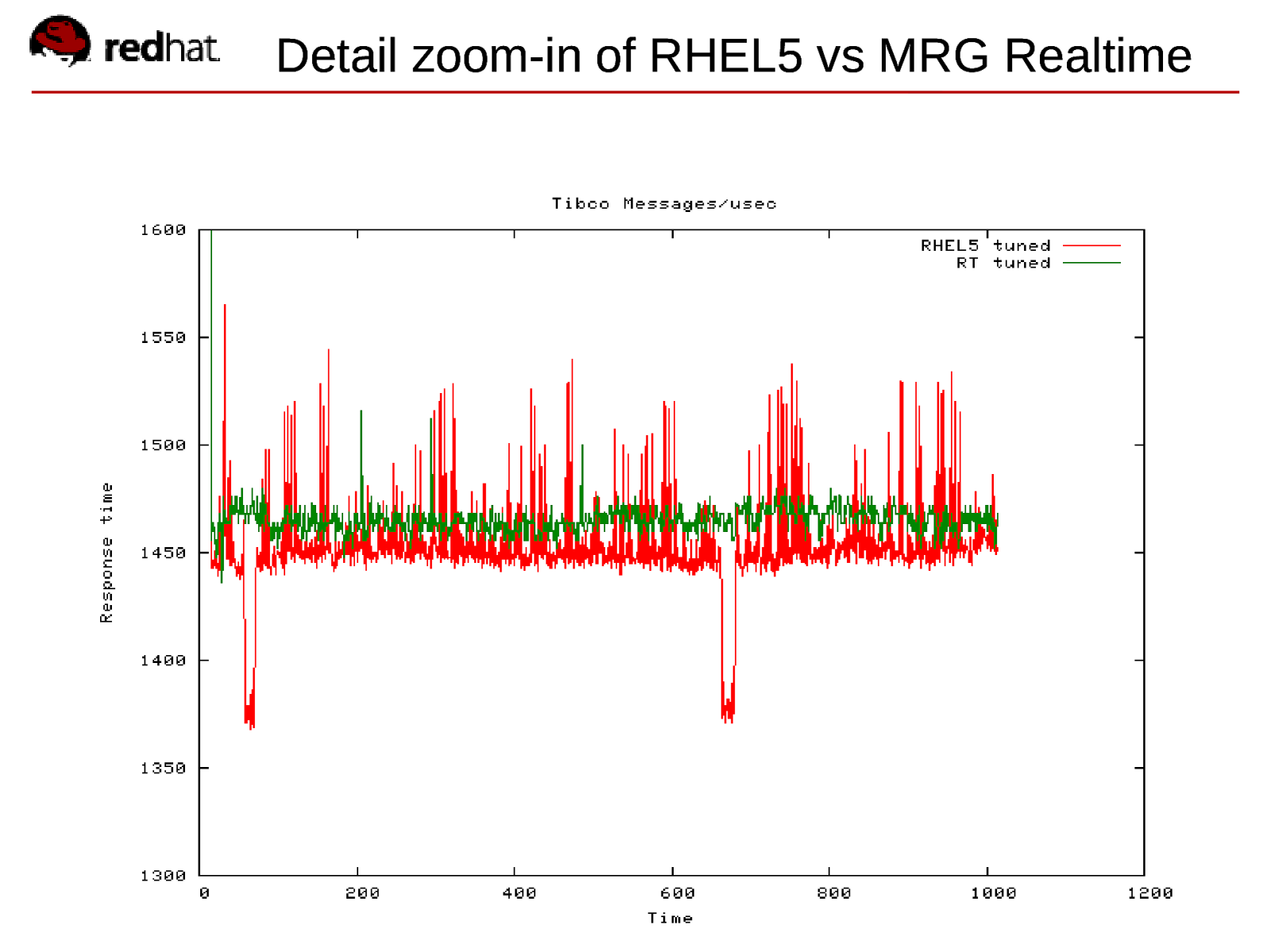
Detail zoom-in of RHEL5 vs MRG Realtime Red Hat Confidential
Slide 25
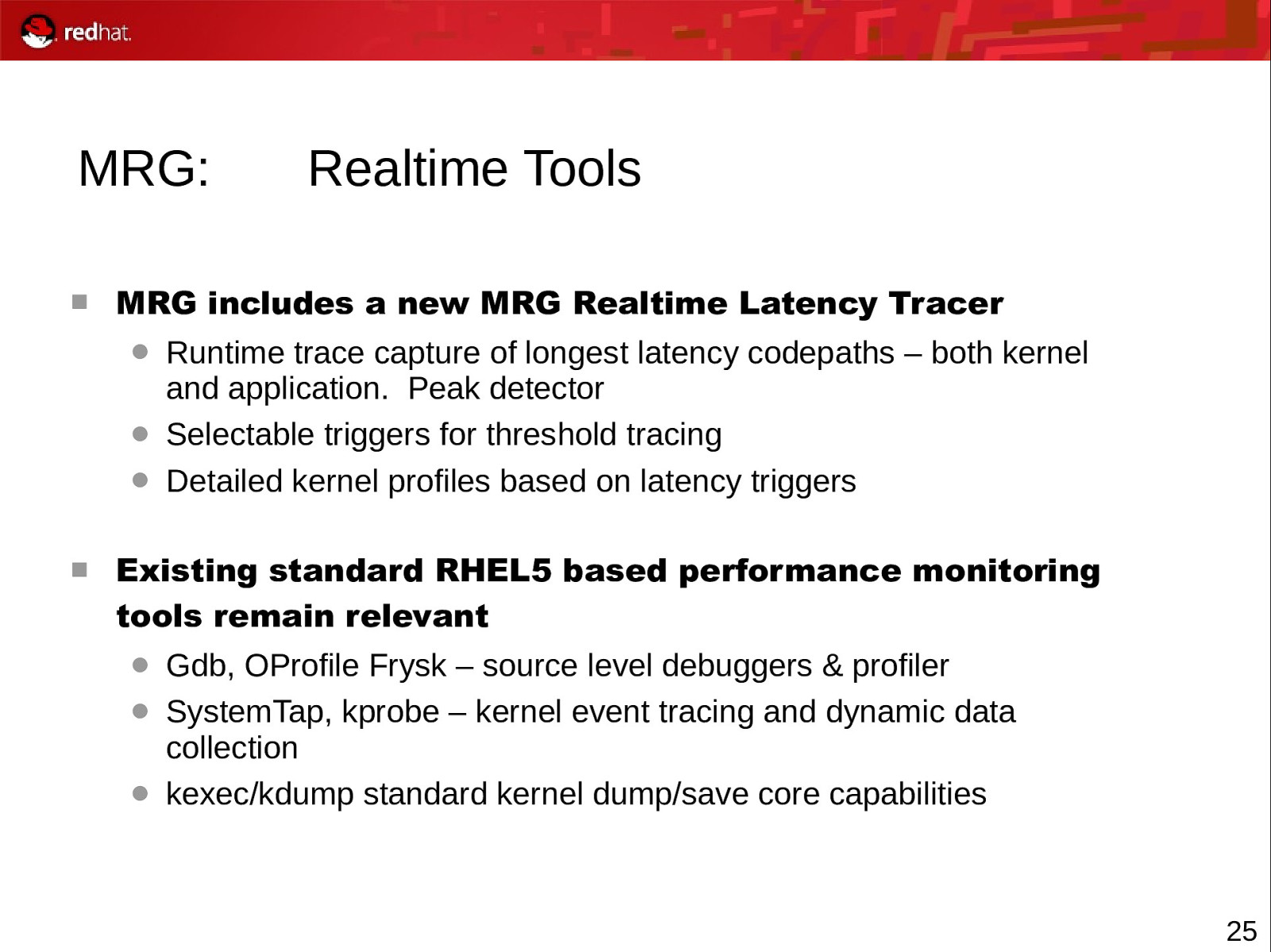
MRG: MRG includes a new MRG Realtime Latency Tracer Realtime Tools Runtime trace capture of longest latency codepaths – both kernel and application. Peak detector Selectable triggers for threshold tracing Detailed kernel profiles based on latency triggers Existing standard RHEL5 based performance monitoring tools remain relevant Gdb, OProfile Frysk – source level debuggers & profiler SystemTap, kprobe – kernel event tracing and dynamic data collection kexec/kdump standard kernel dump/save core capabilities 25
Slide 26
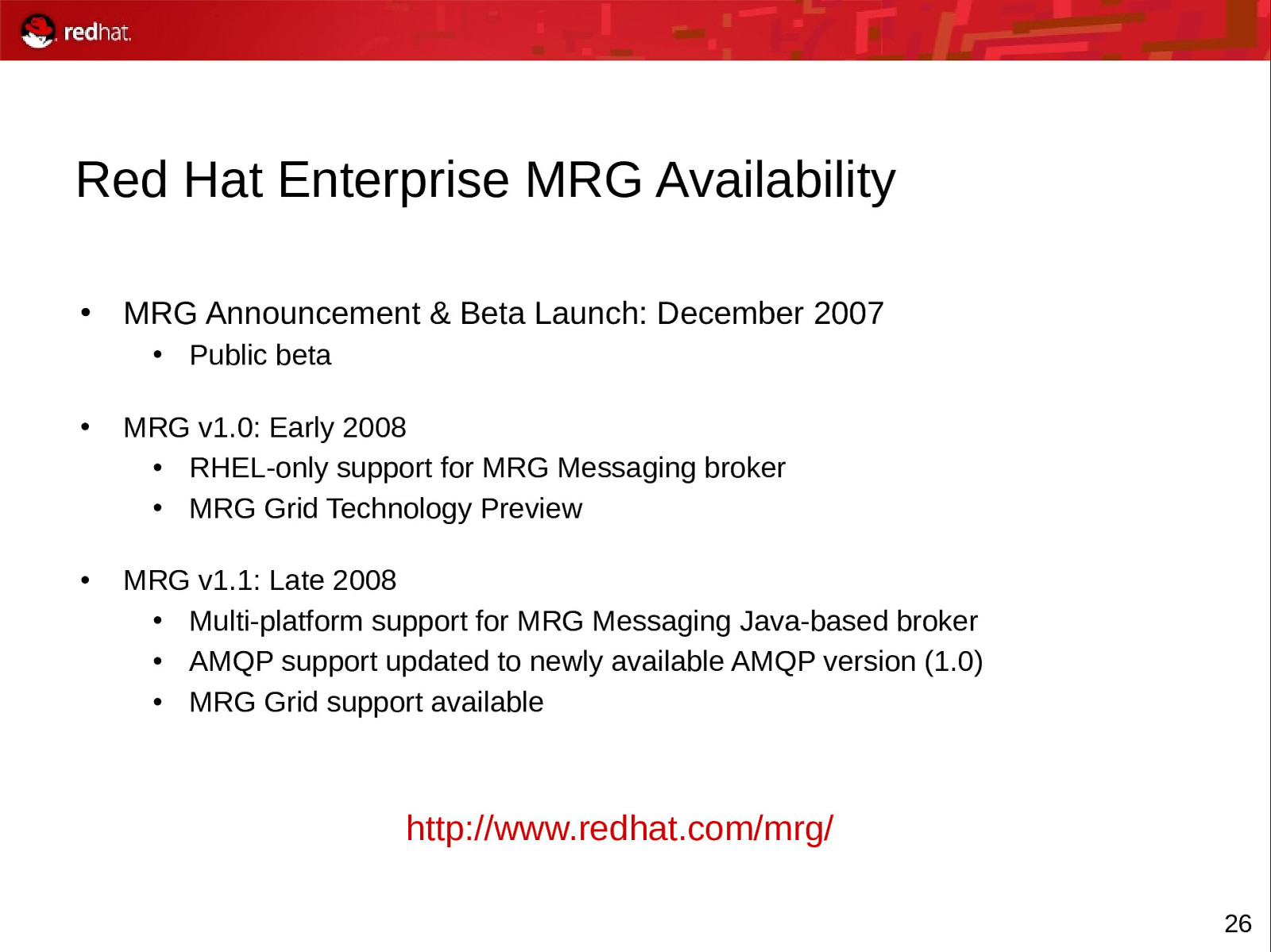
Red Hat Enterprise MRG Availability MRG Announcement & Beta Launch: December 2007 Public beta MRG v1.0: Early 2008 RHEL-only support for MRG Messaging broker MRG Grid Technology Preview MRG v1.1: Late 2008 Multi-platform support for MRG Messaging Java-based broker AMQP support updated to newly available AMQP version (1.0) MRG Grid support available http://www.redhat.com/mrg/ 26
Slide 27
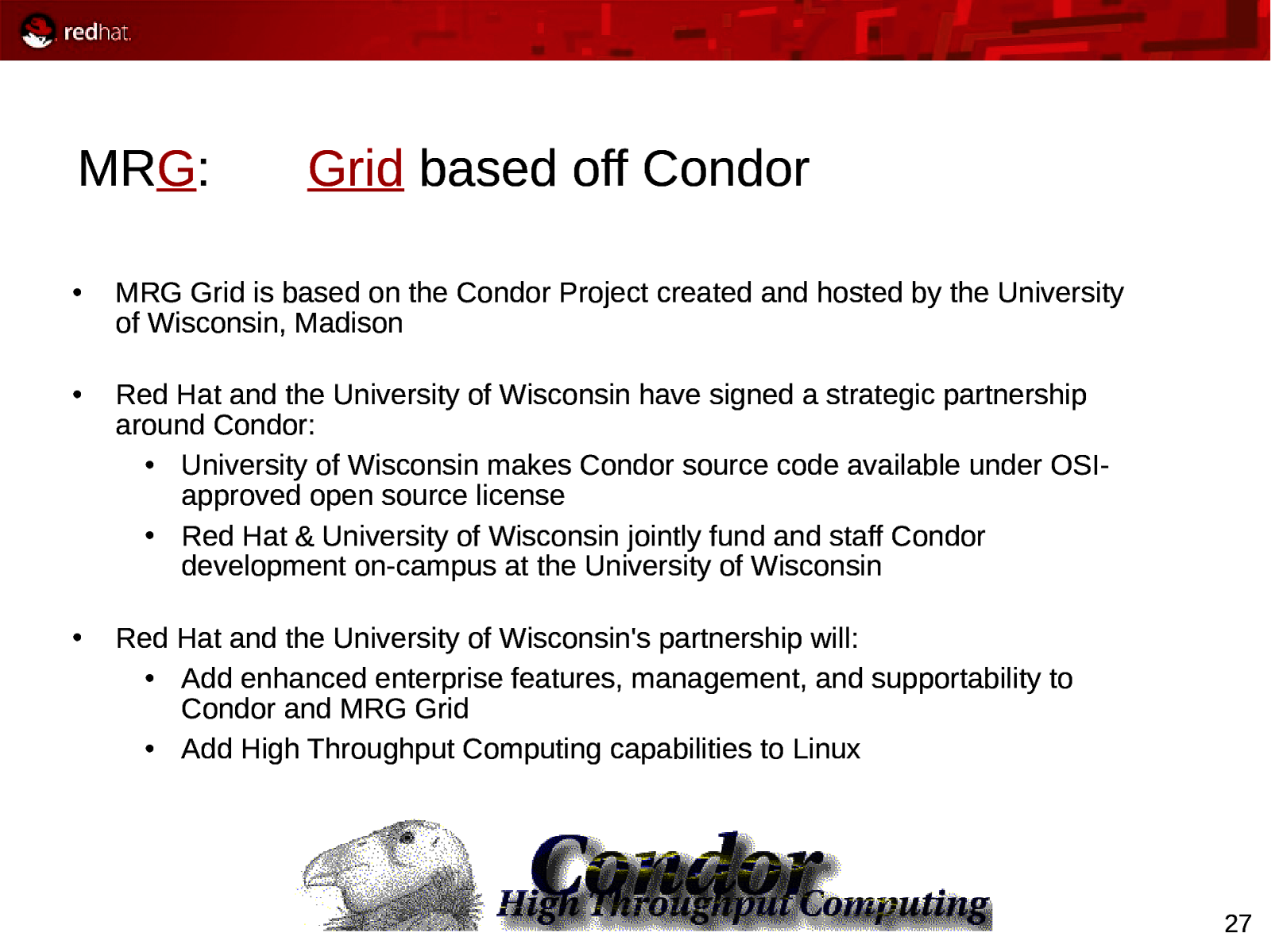
MRG: Grid based off Condor MRG Grid is based on the Condor Project created and hosted by the University of Wisconsin, Madison Red Hat and the University of Wisconsin have signed a strategic partnership around Condor: University of Wisconsin makes Condor source code available under OSIapproved open source license Red Hat & University of Wisconsin jointly fund and staff Condor development on-campus at the University of Wisconsin Red Hat and the University of Wisconsin’s partnership will: Add enhanced enterprise features, management, and supportability to Condor and MRG Grid Add High Throughput Computing capabilities to Linux 27
Slide 28
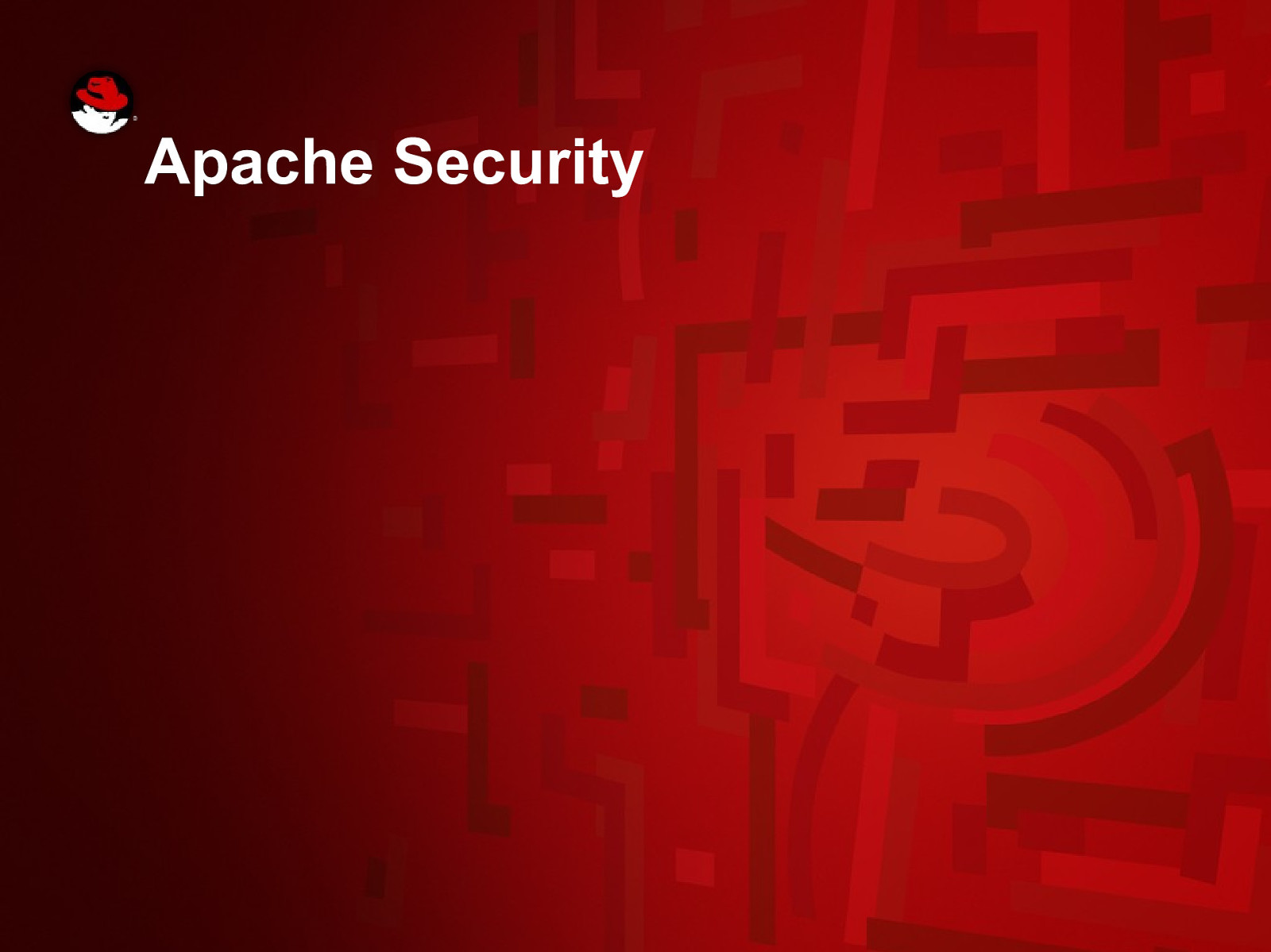
Apache Security
Slide 29
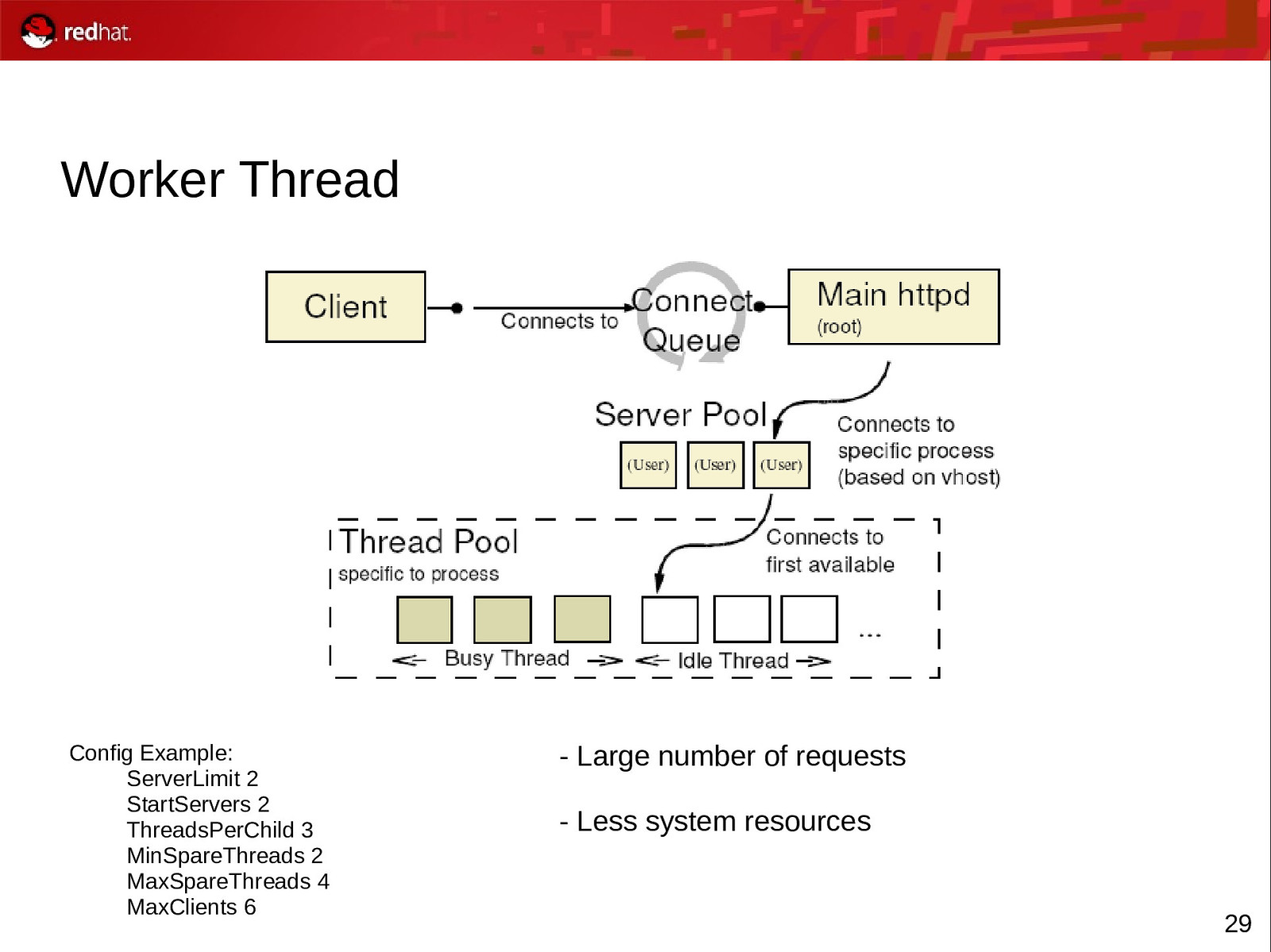
Worker Thread Config Example: ServerLimit 2 StartServers 2 ThreadsPerChild 3 MinSpareThreads 2 MaxSpareThreads 4 MaxClients 6
- Large number of requests - Less system resources 29
Slide 30
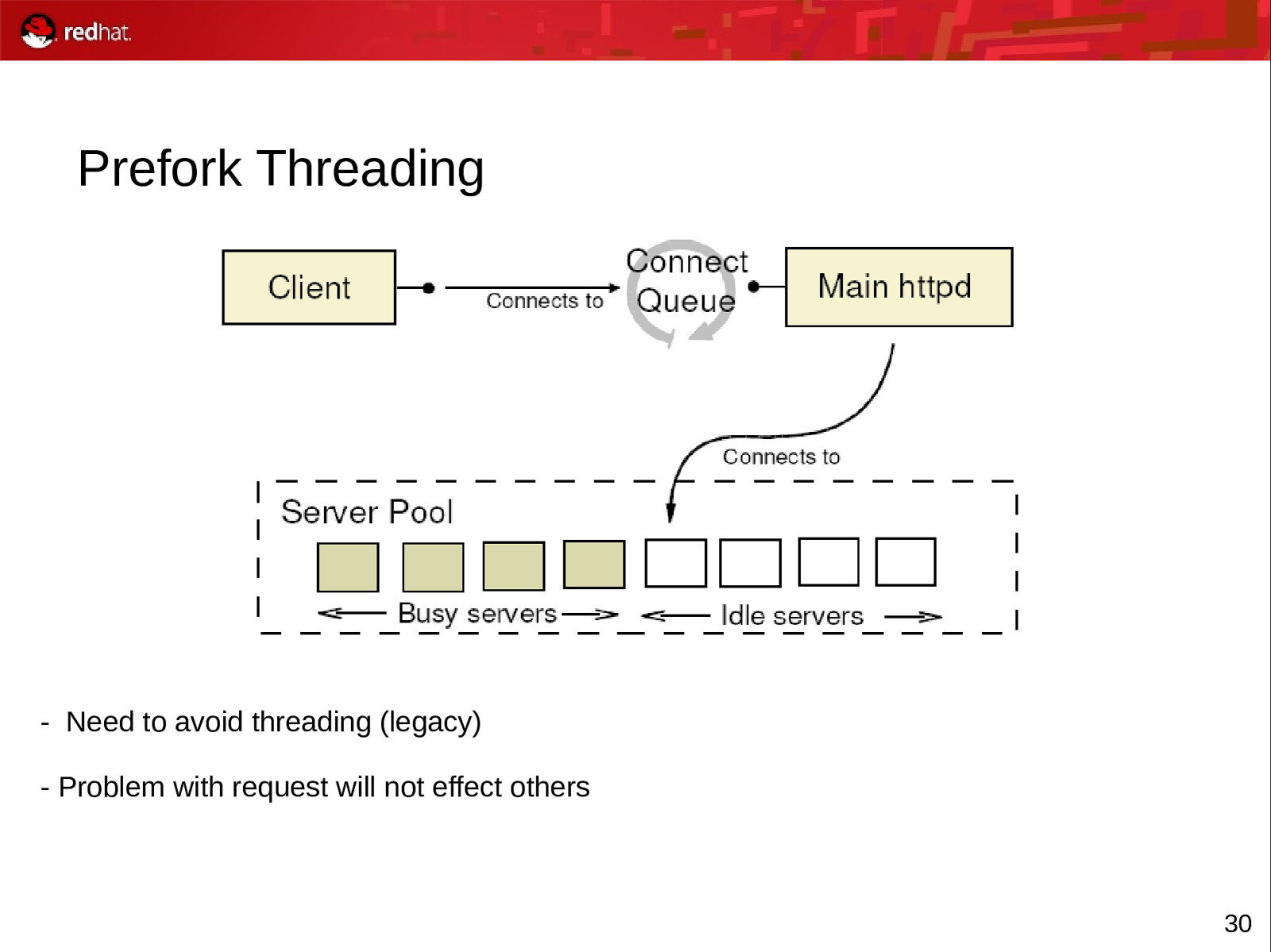
Prefork Threading
- Need to avoid threading (legacy) - Problem with request will not effect others 30
Slide 31
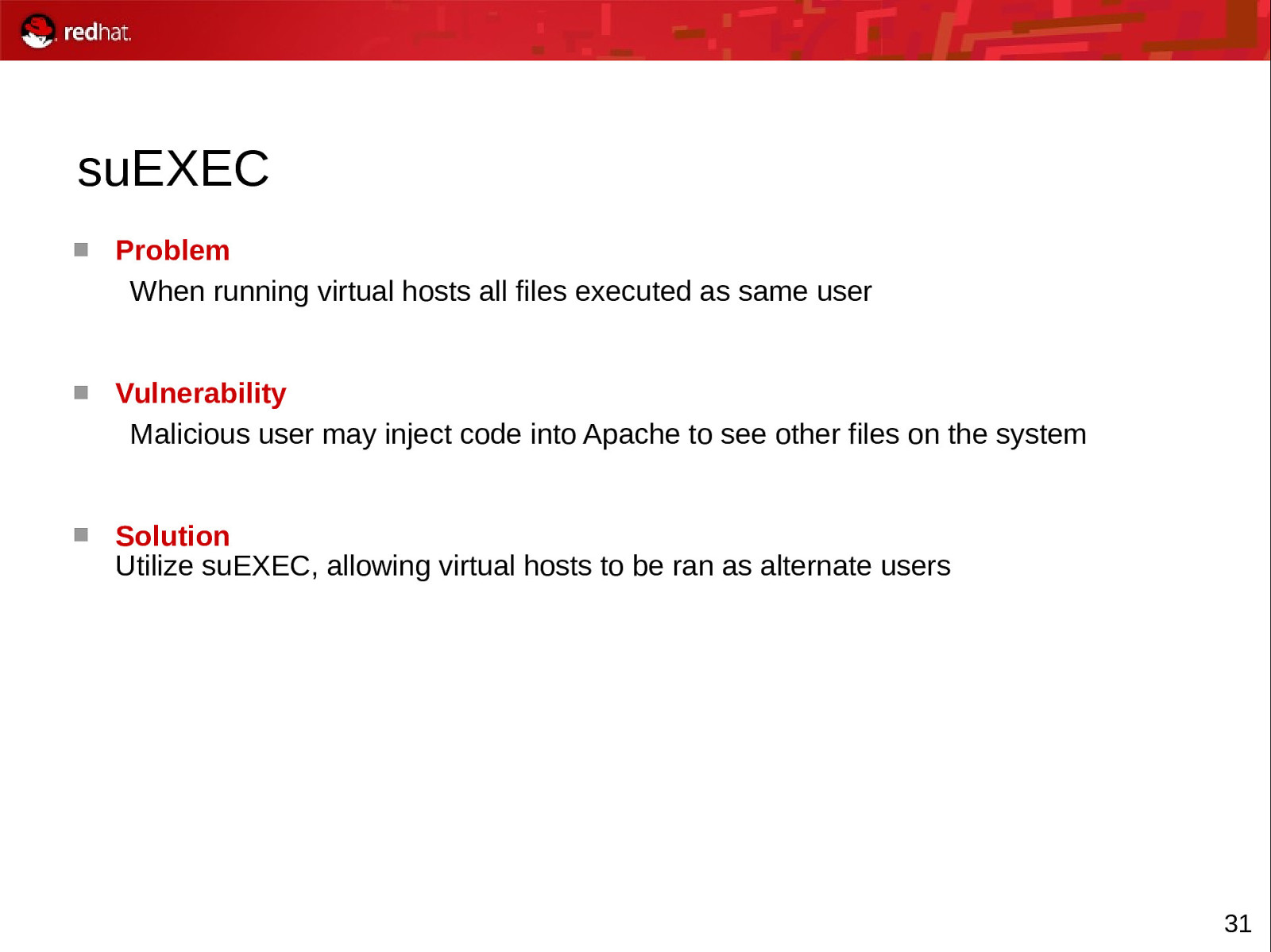
suEXEC Problem When running virtual hosts all files executed as same user Vulnerability Malicious user may inject code into Apache to see other files on the system Solution Utilize suEXEC, allowing virtual hosts to be ran as alternate users 31
Slide 32
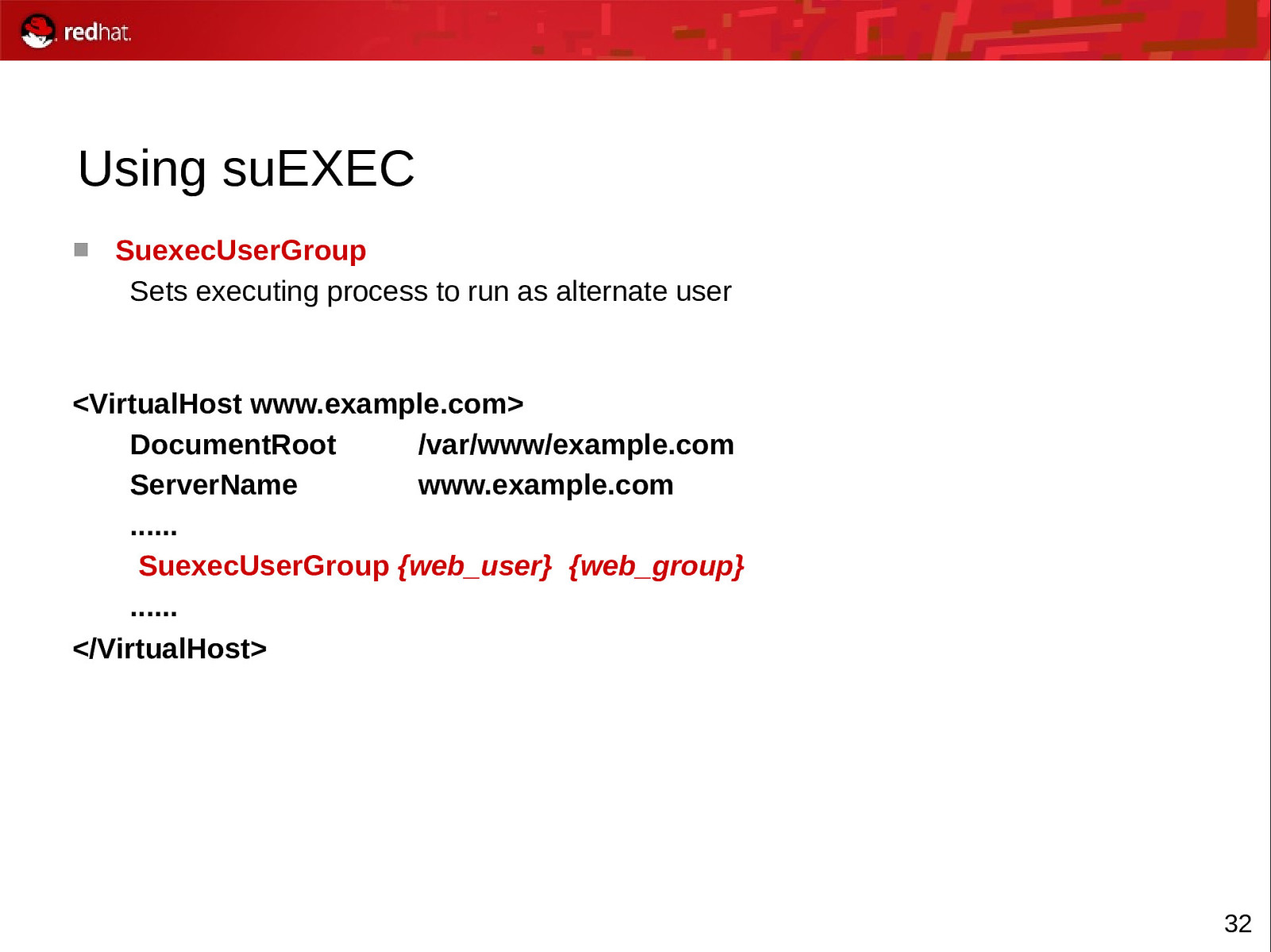
Using suEXEC SuexecUserGroup Sets executing process to run as alternate user <VirtualHost www.example.com> DocumentRoot /var/www/example.com ServerName www.example.com …… SuexecUserGroup {web_user} {web_group} …… </VirtualHost> 32
Slide 33
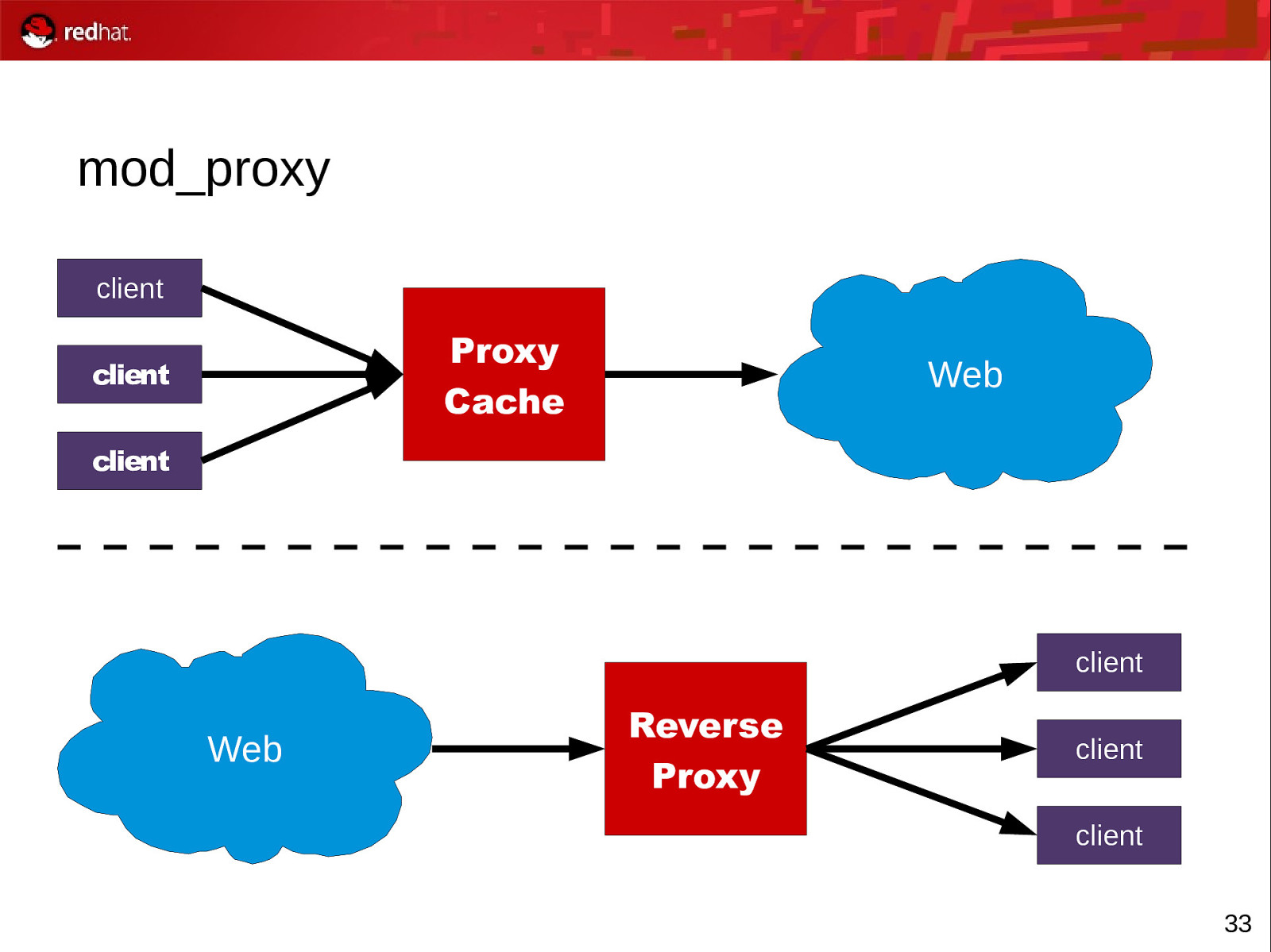
mod_proxy client Proxy Cache client Web client client Web Reverse Proxy client client 33
Slide 34
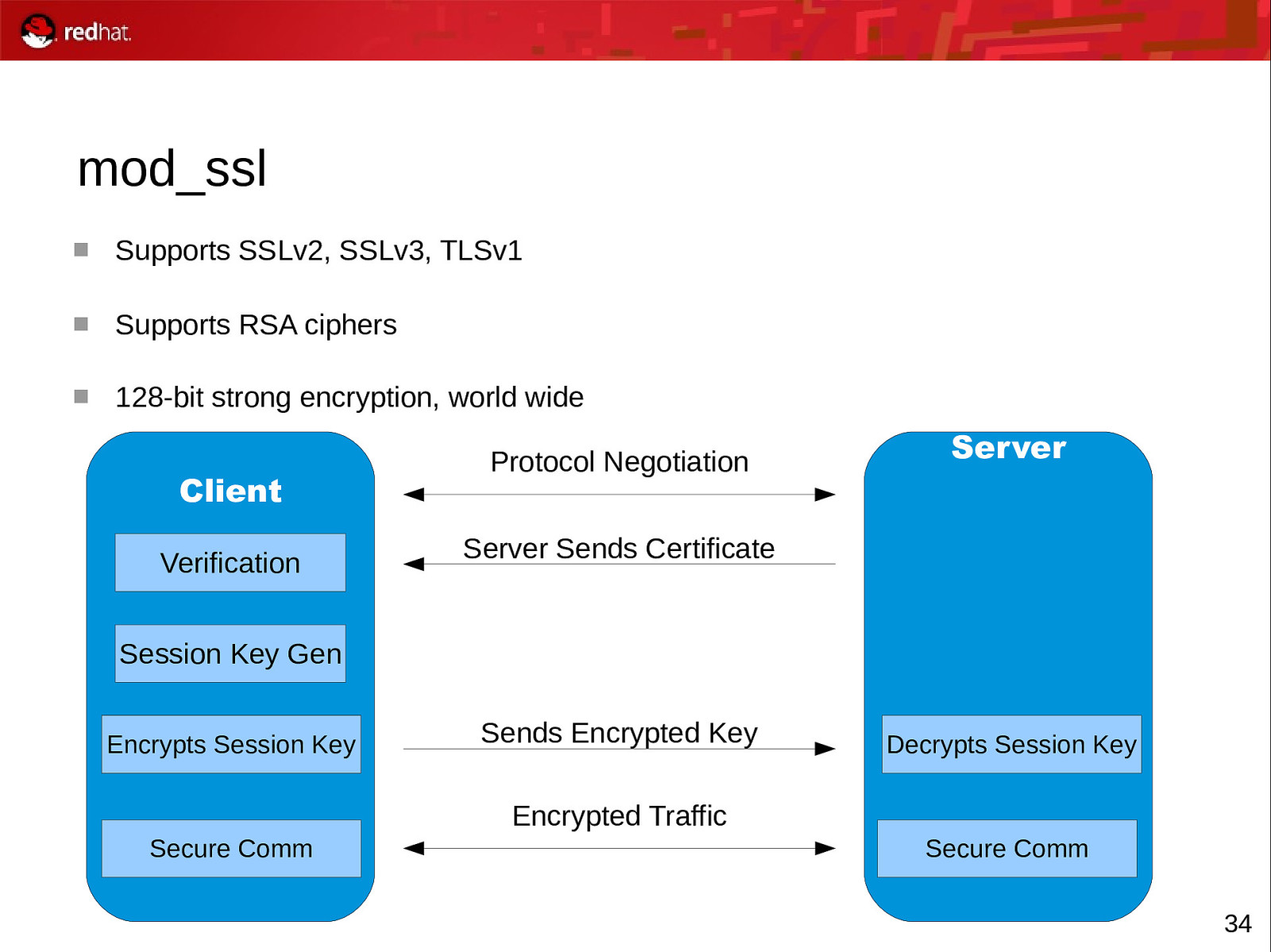
mod_ssl Supports SSLv2, SSLv3, TLSv1 Supports RSA ciphers 128-bit strong encryption, world wide Client Verification Protocol Negotiation Server Server Sends Certificate Session Key Gen Encrypts Session Key Sends Encrypted Key Decrypts Session Key Encrypted Traffic Secure Comm Secure Comm 34
Slide 35
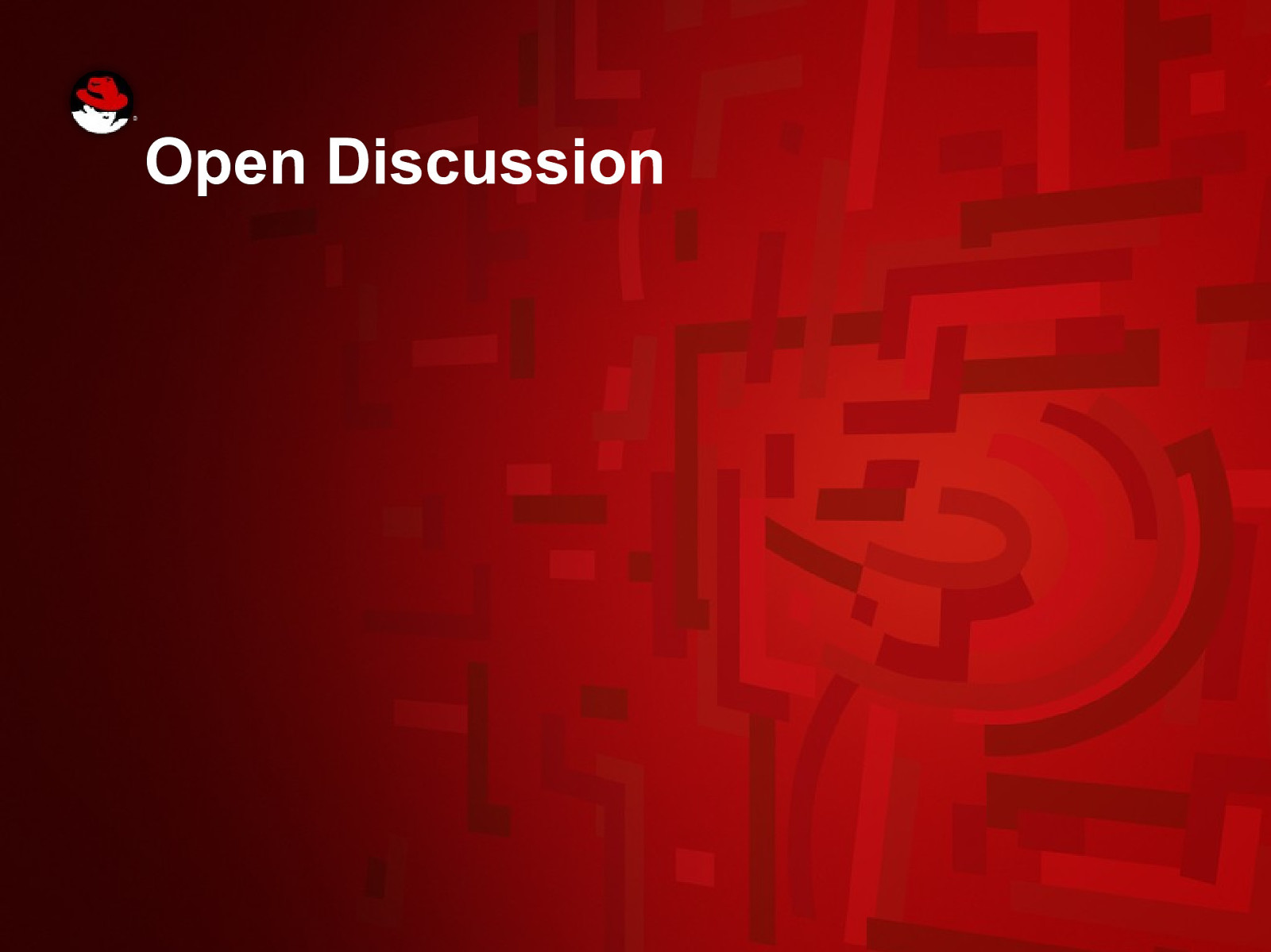
Open Discussion